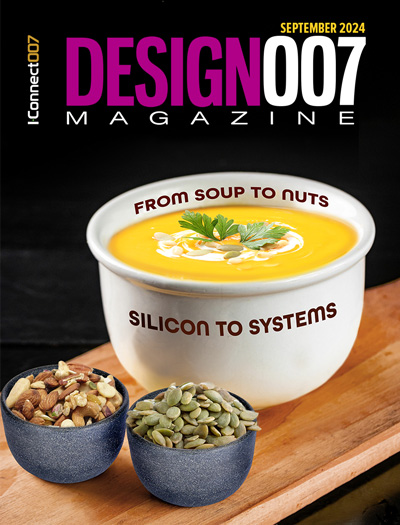-

- News
- Books
Featured Books
- design007 Magazine
Latest Issues
Current Issue
Rules of Thumb
This month, we delve into rules of thumb—which ones work, which ones should be avoided. Rules of thumb are everywhere, but there may be hundreds of rules of thumb for PCB design. How do we separate the wheat from the chaff, so to speak?

Partial HDI
Our expert contributors provide a complete, detailed view of partial HDI this month. Most experienced PCB designers can start using this approach right away, but you need to know these tips, tricks and techniques first.

Silicon to Systems: From Soup to Nuts
This month, we asked our expert contributors to weigh in on silicon to systems—what it means to PCB designers and design engineers, EDA companies, and the rest of the PCB supply chain... from soup to nuts.
- Articles
- Columns
Search Console
- Links
- Media kit
||| MENU - design007 Magazine
Help Us Help You: Does Your Company Use Any of These Chemicals?
July 10, 2019 | IPCEstimated reading time: 1 minute
IPC is seeking insights from its members regarding the use of several specific chemicals in their operations. From now through the end of December, the U.S. EPA will release draft risk evaluations for 10 chemicals. IPC will have opportunities to engage with policy makers during this period and submit comments for the public record.
The chemicals are:
• Asbestos, Chemical Abstracts Service Registry Number (CASRN): 1332-21-4
• 1-Bromopropane, CASRN: 106-94-5;
• Carbon Tetrachloride, CASRN: 56-23-5;
• 1,4-Dioxane, CASRN: 123-91-1;
• Cyclic Aliphatic Bromide Cluster (HBCD), CASRNs: 25637-99-4; 3194-55-6; and 3194-57-8;
• Methylene Chloride, CASRN: 75-09-2
• N-Methylpyrrolidone, CASRN: 872-50-4
• Perchloroethylene, CASRN: 127-18-4
• Pigment Violet 29, CASRN: 81-33-4
• Trichloroethylene, CASRN: 79-01-6
The EPA will use the information received from the public—including IPC and its member companies—to inform the final risk evaluations for these chemicals as required under the Toxic Substances Control Act (TSCA), Section 6(b). The purpose of a risk evaluation is to determine whether a chemical presents an unreasonable risk to human health or the environment under normal conditions of use. To that end, each risk evaluation includes hazard and exposure assessments, risk characterization, and a risk determination.
Please help IPC’s government relations team help you by letting me know how you use these chemicals in your electronics processing activities.
Suggested Items
IPC Japan Puts More Focus on Collaboration, Standards Development, Advanced Packaging
11/26/2024 | Yusaku Kono, IPC Japan RepresentativeIn the past year, IPC has strengthened its relationships with key Japanese companies and government bodies. This was accomplished, in part, by a visit to Japan this past summer, where members of the IPC Asia team, punctuated by standards committee work last winter, forged stronger ties with government officials and companies involved in electronics manufacturing.
IPC Hall of Fame Spotlight Series: Highlighting Patty Goldman
11/22/2024 | Dan Feinberg, I-Connect007In my first article of this special series, I wrote a synopsis of the IPC Raymond E. Pritchard Hall of Fame (HOF) Award, along with a commentary on its first few members, particularly Pritchard. Over the years, IPC members who have contributed significantly to IPC and our industry have been awarded this high honor and recognition. Though many early HOF members have passed away and are unknown to today’s IPC membership, their contributions still resonate. Over the coming months, I look forward to researching and reporting on IPC Hall of Fame members and their contributions. This month, I highlight Patty Goldman.
Winners of IPC Hand Soldering World Championship at electronica 2024 Announced
11/21/2024 | IPCIPC hosted its Hand Soldering World Championship in Munich, Germany, at electronica on 14-15 November 2024, welcoming 14 competitors from 13 companies and 12 countries worldwide. Skilled contestants competed to build an electronics assembly in accordance with IPC-A-610 Class 3 criteria, and were judged on the functionality of the assembly, compliance with the assembly process and overall product quality. The contestants were allowed a maximum of 60 minutes to complete the assembly.
IPC Issues Clarion Call for EU to Reclaim Leadership in Electronics Manufacturing
11/21/2024 | IPCIPC released a synopsis of its recent white paper, Securing the European Union’s Electronics Ecosystem. This condensed document presents a comprehensive overview of the current challenges in Europe’s electronics manufacturing industry and shares actionable steps to help the EU achieve a stronger, more autonomous ecosystem.
Enjoy the Journey: PCB Design Instructor Kris Moyer on His Sustainable Lifestyle
11/19/2024 | Michelle Te, IPC CommunityWhen I contacted IPC design instructor Kris Moyer to discuss his sustainable lifestyle, he responded to my text with a call. "I'm calling you from about 8,000 feet, sitting at the foot of Mammoth Lakes," he told me. “My friends and I are about to get in the pool for the afternoon." Kris can do this because he actually lives full-time in his travel-trailer at this campground. He's now a permanent camper, taking him anywhere the winds blow—and where there's strong internet service—so he can teach his PCB design classes, offer expert interviews, and live off the land.


